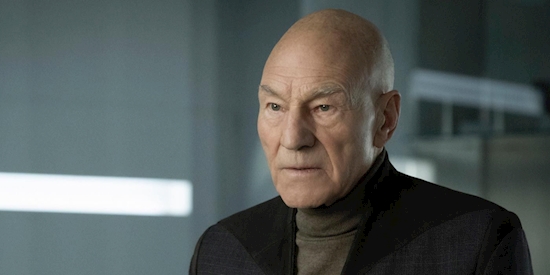Star Trek: Picard's Anger At Starfleet Means More Than You Think
WARNING: The following contains spoilers for "Remembrance," the series premiere of Star Trek: Picard, streaming now on CBS All Access.
With its titular hero, Star Trek: Picard marks the return of Jean-Luc Picard, someone who's arguably the greatest captain in the history of the franchise. But after a life in service to Starfleet, some of the latest Star Trek premiere's biggest surprises were the circumstances of Jean-Luc’s resignation from Starfleet. Early trailers had clued the audience in that Picard felt guilty over some unseen past sin and was at odds with the current Starfleet administration as a result, but those preivews never gave away just how angry and disappointed the former Star Trek: The Next Generation star was at the organization.
Click the button below to start this article in quick view. Start nowDuring an interview commemorating the destruction of Romulus, a reticent Picard tries to avoid talking about what happened. Picard, who was an admiral at that point, was tasked to lead relief efforts in the days leading up to the Romulan sun’s supernova, relocating the millions of Romulans at risk of their homeworld’s destruction. But a pushy journalist breaks the terms of the interview and asks Picard about the Mars attack that ultimately led to his resignation.
A group of synthetics, who were apparently similar to Picard’s departed friend Data, laid siege to Mars, the home of the shipyards constructing the fleet needed to evacuate Romulus. Tens of thousands of lives were lost and due to the ignition of chemicals in the atmosphere, the surface of Mars was still smoldering 14 years later. While the move to help the Romulans was already controversial, the destruction of Mars caused Starfleet of the Federation to abandon the promised Romulan aid.
In response to all of this, Picard resigned on the spot. When pressured about the incident during the interview, Jean-Luc snapped. He proclaims that he left because Starfleet “was no longer Starfleet!”
He admonishes Starfleet by saying that they had slunk from their duties, letting lives extinguish out of fear. When the reporter asserted that the lives at risk were "Romulan lives," Picard was quick to correct. “No, lives.”
The disconnect between the way Starfleet acted and the ideals that it's supposed to stand for was too much for Picard, and that ultimately gave Jean-Luc no choice but to leave. The show could have started with Picard in retirement for any number of reasons. The creative forces behind the show chose these particular circumstances to make a deliberate point.
With his complaints against Starfleet, Picard seems to be addressing the Star Trek franchise itself. Although it was once defined by its unyielding optimism and utopian ideas about humanity's future, it's gotten more dark and gritty, like much media, over the past few decades.
Dark and gritty has become the go-to for generating excitement in entertainment over the last few decades, but Star Trek is held dear by its fans for its unyielding optimism and faith in the overall goodness in humanity.
The 2009 J.J. Abrams Star Trek reboot was seen as a point where the franchise had veered in the more violent, action-oriented, blockbuster territory, but Star Trek has been getting grimmer ever since TNG ended. Star Trek: Deep Space Nine, the series that followed that show, introduced viewers to an amoral, rogue wing of Starfleet, Section 31. While they have been utilized to tell good stories, their entry into canon has been a point of contention in the fanbase. Starfleet was supposed to be incorruptible and the presence of Section 31 seemed to go against the core principles of Roddenberry’s vision. Despite this, Section 31 only became more prevalent in subsequent entries, even serving as the antagonists for Abram’s follow-up film, Into Darkness, and having a major role in Star Trek: Discovery, which began with a similarly grim focus on war.
Not even Captain Picard was immune to this tonal shift. The last TNG film, Nemesis, was widely panned for being too dark and violent for a proper Star Trek film. It was so grim that it ended with the death of the fan-favorite Data— a point Picard has wholeheartedly leaned into.
It is not a coincidence then, that Jean-Luc Picard has returned to Star Trek at this particular moment in time with the message he is conveying. Picard, maybe more so than any other figure in the franchise, represents Star Trek’s moral center, its conscience. He has returned to the screen 20 years since we’ve last seen him, and his words of compassion and hope are meant as a wake-up call.
His anger at Starfleet can easily be seen as a rebuke for the franchise as a whole, and this admonishment coming from a figure as respected as Picard comes with a particular weight. It’s very easy to be jaded and look at Star Trek’s optimism as silly or antiquated. But in a fraught world with an over-abundance of dark and grim media, Jean-Luc’s rallying cry feels revitalizing and necessary.
Star Trek: Picard stars Patrick Stewart, Alison Pill, Michelle Hurd, Evan Evagora, Isa Briones, Santiago Cabrera and Harry Treadaway. New episodes of the series premiere every Thursday on CBS All Access.
Source: www.cbr.com

